Bitter Harvest: A Woman's Fury a Mother's Sacrifice Read online
Page 8
Celeste had thought Mike handsome the first time she saw him, and she would later admit she was strongly attracted to him—but she had not the remotest notion that he saw her as anything more than another mother from Pembroke Hill School. That was just as well. Her life was too complicated as it was. She was a married woman, and she was a confused and miserable married woman. The last thing she needed was to become involved with another man. But she could not deny the longing she had felt for the past five years, the need to share her life with someone.
In Peru, Mike grew a beard and wore a wide-brimmed “Indiana Jones” hat to ward off the relentless sun. He seemed even better looking than Celeste remembered. He was still a take-charge kind of man, eager to start each day’s hike or climb or boat ride. She could not help comparing him with John, who was so exhausted by a day’s work in the operating room that he couldn’t stay awake.
Celeste and Carolyn Stafford admired the way Debora and Mike discussed things in a calm, reasonable way. One day, they watched as the couple worked out who would pick up Lissa in St. Louis when they got home. It seemed to Carolyn and Celeste that the two had the perfect egalitarian marriage.
“He was going to go to St. Louis,” Celeste said, “and she was going to take care of the stuff from the trip—and then Mike said, ‘You know, I’m much better at doing the laundry, so why don’t you go get Lissa, and I’ll do the washing.’ Carolyn and I just looked at each other in awe. Here was a married couple who could work things out without worrying about roles. They were both happy and we were impressed. This is what a good marriage is.”
Or was it?
“They seemed very married,” Celeste said later. The image that Debora and Mike presented to the world was of two people who were together so much they were almost joined at the hip. Of course, Celeste knew nothing about their separation less than a year earlier. The act they put on—if it was an act—was flawless.
Odd, then, that from the second or third day, Celeste had picked up on “weird vibes” from Debora: “She talked to everyone on the trip, but never to me. Every time she could, she excluded me from the conversation.” Debora seemed jealous of her, so Celeste bent over backward never to be alone with Mike. And, as happily married as Debora and Mike seemed to be, there was an undercurrent that puzzled Celeste. Debora had everything—a solid marriage; an attentive husband—but sometimes she appeared to be on edge. And she seemed to go out of her way to ignore Celeste. Celeste watched to see if Debora was that way with anyone else, but no—the animosity was directed at her.
“We were on a bus once,” Celeste said. “And Deb and Mike were sitting across from Carolyn and me. I remember being really careful that my knees didn’t touch Mike’s. I knew somehow that that would bother Deb.”
Another time, Celeste found herself on a climb with Mike, a hike that Debora had passed on. “It was the day after Machu Picchu,” she remembered, “and we were in Agua Caliente. A lot of people wanted to go shopping, and that’s the last thing I wanted to do, so I suggested we go hiking. Michael and I went, and Brett and Tim went. We hiked together all the way up to the top of a waterfall and all the way back. Coming back up the railroad track to the hotel where everybody was waiting for the train, Brett and Tim were walking really fast. I was trying to catch up with them and I couldn’t. It ended up that Mike and I came walking back together. It crossed my mind, ‘This doesn’t look good—Deb might think this is really weird.’ But nothing had happened at all. I remember I deliberately put a lot of space between us as we came back to where they were all sitting on the patio. I felt guilty—but I had no reason to. It was perfectly innocent and the kids had been along.” Still Debora stared at Celeste, and Celeste saw frank enmity in her eyes.
Nevertheless, Debora was the spark plug of the Peru tour and everybody liked her. Even Celeste considered her the hit of the trip: “Deb had the best sense of humor! She was the wittiest. She was hysterically funny—she is so smart. She could make connections between things that other people didn’t get. Her jokes were always at someone’s expense. I laughed so hard I was falling down—I couldn’t even hike behind them, she was so funny. She was the best thing that could have happened to us on that trip.”
But the Peru trip wasn’t all fun. Mike had studied up on what diseases they might encounter and had done his best to see that no one suffered anything worse than “Montezuma’s revenge,” the travelers’ diarrhea that is pre standard for tourists in South America. “We all took malaria prophylaxis,” he recalled, “and we had vaccinations for hepatitis A.”
About 90 percent of the adults and three or four of the children developed fairly severe diarrhea in the first few days. Mike had taken along a good supply of the antibiotic Cipro to kill the bacteria that caused the fever and diarrhea and shorten the course of the illness from five to seven days to only thirty-six to forty-eight hours. The Cipro worked well, but even so, it took about forty-eight hours for the sufferers to recover. Mike himself suffered a bout; Celeste was knocked flat for two days, and she lost a night’s sleep. But although the diarrhea was miserable, it was not life threatening. Once it was gone, it was gone; no one feared they would bring some terrible bug back home to Kansas City.
If Debora sensed Celeste’s admiration for Mike, she didn’t mention it. Celeste was the most attractive woman in the group, and she was an energetic hiker, while Debora’s weight and her bad knee made her less than enthusiastic about some of the more vigorous climbs. The two women had pleasant enough conversations with each other at first. One day, on a riverboat, Celeste asked Debora why she was no longer in practice. “She said she had to stop because she needed to be with her kids,” Celeste recalled. “But she had an offer from someone to go into family practice. She said she kept giving them reasons why she couldn’t do that at the time. I remember she said she was running out of excuses not to go back to work. I’d been out of my nursing practice for ten years, and I told her I thought the family practice sounded great, that I missed nursing. I was longing to get back in the mainstream….
“But then later Mike told me that Deb was always going to go into some different kind of practice.”
Celeste was captivated by Mike, as much as she tried to deny it. Except that they were both physicians, he was the antithesis of her husband. Mike was so interested in everything, so full of life. Celeste envied Debora, having such a vital man for a husband. One thing became apparent to Celeste in Peru: she had laughed so much, had so much fun—and had observed couples who actually enjoyed their marriages. “While I was gone, I came to the truth that John and I were so incompatible it would never be a satisfying marriage.”
Unfortunately, John had come to the opposite conclusion: “John said it was worth trying again to salvage it.”
It was the beginning of a strange and tragic summer.
8
Although Celeste and Mike were nothing more than members of the same traveling group in Peru, they had felt a tremendous magnetism between them. That wasn’t surprising; they shared more than most people knew. Celeste and Mike had the same energetic, optimistic nature. And they had both stayed in their marriages for years after they became convinced that there was no hope, comfort, or passion to be found there. Celeste had been faithful to John, but she longed for some intimacy in her life. And Mike had been faithful to Debora since they moved into the house on Canterbury Court, but he kept alive his decision that their reconciliation was a disaster. He had made a stupid mistake in going back.
The façade of togetherness that Mike and Debora had managed to maintain on the Peru trip cracked and fell away the second day they were home. True, in the conversation that had so impressed Celeste and Carolyn, they had calmly worked out the logistics of who would drive to St. Louis to get Lissa. Debora would go, while Mike stayed home to unpack and start doing laundry.
It was July 8 when Debora left for St. Louis. Leaving six-year-old Kelly alone in the house with a sleeping Tim, Mike went to see Celeste. Debora was furious. “We had broug
ht some things home for her [Celeste] in our luggage, and he went over there—and left the children alone, left Kelly alone with no one to supervise her,” she said tightly. And, she insisted, her husband wasted little time that day.
Mike did, in fact, go to Celeste’s home in Overland Park that hot July 8 to deliver some souvenirs and artifacts of hers. “Everyone fit stuff into their suitcases where they could,” Celeste said, “and we figured out what belonged to who later.” She thought Mike might also have brought some photographs that he had had developed in a one-hour camera shop.
Whatever the reason for his visit, the end result was the same: on that day, in her home, Celeste and Mike began an affair. Mike had felt the same pull toward Celeste that she had toward him, although their behavior in Peru had been completely circumspect. They had never even spoken of how they felt, not until that moment; Celeste had assumed that Mike had no interest in her. But now, as Celeste showed him her backyard, it was apparent to both of them that they wanted more than friendship. “I could see it in his eyes, too,” she said.
Their coming together as lovers immediately produced the need for secrecy and subterfuge—more so than most affairs. Those who had gone to Peru had become friends, and there would be parties and get-togethers all summer. Celeste and John and Debora and Mike would be thrown together frequently; it was not as though either had begun an affair with a stranger. It probably would have been better if they had.
Their affair was not a matter of stealing away to motels, although it was sexual. Nor did they see each other alone that much; they were lucky to meet two or three times a week. Even then, sometimes they just parked their cars and talked. “It wasn’t often [that they met],” Celeste said. “He had to go home, and I had to be with my family…. Mostly, we just talked a lot.” Their affair was one of sharing, of many, many phone calls to touch base, to hear kind words, to make quick promises that were almost impossible to keep. Within a matter of days, Mike had told Celeste that he found her the perfect woman, so beautiful, the woman he had been looking for. She had wanted to hear that for so long, it was easy for her to believe.
And Celeste would later say that she thought no one would ever have suspected that she and Mike were having an affair. “We were that discreet.”
It wasn’t easy. The Peru gang spent a lot of time together that summer of 1995. Kansas City’s Fourth of July fireworks had been postponed because of inclement weather; now many of the travelers went to see the delayed show. “John was there, and my mother, and sons, and Mike and Deb. I’m not sure if Tim was,” Celeste recalled. “And Carolyn and Laura Sutherland…. I really liked these people and so I called them and tried to get a bunch of them together for the fireworks.”
Celeste threw an all-adult party on July 15, inviting Carolyn Stafford, Mike and Debora, and some other people from the trip. When it got dark, they showed slides of Peru in the backyard. Celeste had talked on the phone about it with both Debora and Mike.
On the last weekend of July, Celeste also threw a backyard barbecue and pool party, meant to be a trip reunion. Again, Mike and Debora came. Debora talked pleasantly enough to Celeste, who believed she had no idea that anything was going on.
There was no question that both Celeste and Mike wanted their fledgling affair to continue. The encouragement and affection—and, yes, the sexual fire—that Mike got from Celeste made his marriage seem all the more bleak in comparison. He had been waiting for seven months to tell Debora that their marriage wasn’t working, that he truly wanted his freedom. He was desperate to be away from her, yet afraid of the scene he knew she would create.
Mike also worried about his children: what would become of them if he left Debora and moved out? But, he decided, they would be better off with a single parent, in a home where there was no arguing, than they were now. He would gladly be that custodial parent—if Debora would agree.
It was so hot that summer; the air was thick and still. When the wind blew, it was like a blast furnace, stirring up dirt devils in the dust. Gardens burst forth into bright flowers and the sunflowers bent under their own weight on ten-foot stalks. There were no flowers around 7517 Canterbury Court; Debora had never been interested in gardening. The trees that had been there when they moved in were enough. The kids enjoyed their pool, Mike went off to his office very early every morning and came home late, and Debora lay in bed reading.
Mike had vacillated for months, weighing his dread of another thirty or forty years with Debora against his almost equal dread of a “horrible divorce.” They were not getting along, and they never would. It was as simple as that. Neither of them could heal unless they made a clean break and started to build separate lives.
Sometime in late July, Mike asked Debora for the second time if she would give him a divorce. The result was a “terrible outburst,” far worse than even he had expected. “It was … volatile behavior,” he said, “screaming, a lot of profanity, hitting herself. It was awful.”
Debora opposed the idea of a divorce, although she had no choice, really. She would not hear of their telling the children together, or of planning the best way to break the news to them. She was not going to let Mike walk away from the marriage looking like a man with a shred of decency; it was more important to punish him than to cushion the blow to their children. Just as she had done the first time, Debora told Tim, Lissa, and Kelly in her own way: a hysterical outburst designed to make the children detest their father. He had broken his promise to them, and he was leaving them all. Not surprisingly, Mike’s older children hated him after that.
There was so much hate in that beautiful hour on Canterbury Court. Debora hated Mike. He had come to detest her. Their children were carefully schooled to stand by their mother, the victim, and to revile their father.
But however much she hated him, Debora wanted to stay married to Mike—for many reasons, some probably too convoluted to understand. Possession was one, of course. Mike was her husband; she had viewed other women with suspicion long before he was guilty of infidelity. As the family of a highly respected, wealthy physician, she and the children had a place in society; without him, she feared losing that.
Perhaps most important to Debora was her dream that both Lissa and Kelly would be BOTARs (Belles of the American Royal). Kansas City has two “coming out” events, at which debutantes are introduced to society: one is the Jewel Ball, the other the American Royal, a horse and livestock show that lasts almost two weeks. There are several social activities during the celebration of the American Royal, but the BOTAR Ball is the most visible. About twenty young women are presented at the BOTAR Ball each year. They are the loveliest, most talented daughters of haute Kansas City. Debora wanted Kelly and Lissa to join them. She wanted Tim to be a BOTAR escort.
If her children’s home was broken, Debora was certain, they would lose their chance to move among the most sought-after young people in the area. She had never been a debutante—not in Peoria—nor a beauty queen. The kudos she received had all been for her superior intellect; she seemed, now, to be living through her “beautiful children,” as she called them. She wanted them to move easily in the rarefied air of Kansas City society.
Most of all, Debora did not want to lose any more of her prestige and her self-esteem. Mike was a well-known and successful cardiologist and she was his wife. For all the bragging she had done about her intellectual brilliance, she was not a confident woman. A long time before, she had been the one who had money, far more money than Mike; now she was dependent upon him for everything. Quite simply, Debora had failed at everything from the practice of medicine to the most basic housekeeping. And now she was facing a failed marriage.
She buried herself in novels and books about bizarre crimes that summer, wasting her mind on escapist literature. She checked books out of the Johnson County Library and the Corinth Library in Prairie Village, usually eight or more at a time, and she bought numerous paperbacks. Her book selections were full of violence: Blood Oath; Wedded toCrime: My Life in th
e Jewish Mafia; Amy Fisher: My Story;Blood Sister; Blood Games: a True Account of Family Murder; Bodies of Evidence; The Murder of Little Mary Phagan; Smoked: A True Story About the Kids Next Door;Final Justice; and Before He Wakes: a True Story of Money,Marriage, Sex and Murder. Some of the books she chose were light novels—by Danielle Steel, for instance. Still, Debora seemed fixated on bloody murder—particularly within families—during the high summer of 1995.
There seemed no way to achieve a happy or even a civil ending to their marriage. Mike didn’t move out; his children wanted him to stay, and he vacillated between desire and guilt. Debora moved to the guest bedroom on the lower level, which had its own private bath. That summer, she and Mike lived together in a wary, tight-lipped silence, as if in an armed camp.
There was another reason Mike didn’t move out. Debora, who rarely had more than a glass of wine or a single highball, had suddenly begun to drink so heavily that he dared not leave the children with her at night. It was not unusual for her to drink a liter and a half of vodka or gin over a period of two days. Although there had been intervals when she was addicted to painkillers and sleeping pills, she had never been a heavy drinker. Now, with no practice and no hospital work to give her access to drugs, she was apparently filling the void with alcohol.
Debora’s days took on a bizarre kind of order. Somehow, she drove her children to their lessons, their sports events, their friends’ houses; then, once that was done, she closeted herself with a bottle of liquor and drank until she passed out. On some days she was too drunk to get out of bed. Once, Mike found her passed out on the basement floor. And her language was foul. Her remarkably high consumption of alcohol loosened her inhibitions so much that she made no effort whatsoever to watch what she said in front of Tim, Lissa, and Kelly.

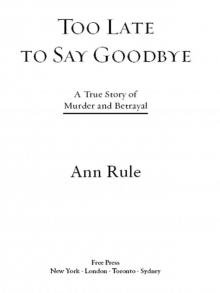 Too Late to Say Goodbye: A True Story of Murder and Betrayal
Too Late to Say Goodbye: A True Story of Murder and Betrayal Green River, Running Red
Green River, Running Red Bitter Harvest
Bitter Harvest Dead by Sunset: Perfect Husband, Perfect Killer?
Dead by Sunset: Perfect Husband, Perfect Killer?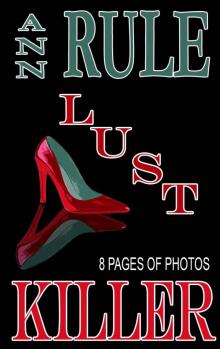 Lust Killer
Lust Killer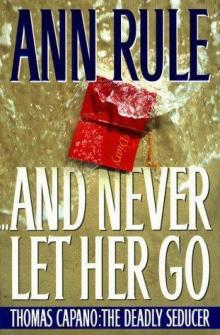 And Never Let Her Go: Thomas Capano: The Deadly Seducer
And Never Let Her Go: Thomas Capano: The Deadly Seducer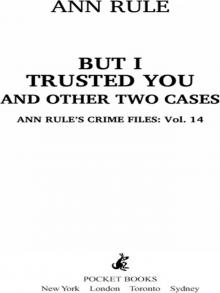 But I Trusted You and Other True Cases
But I Trusted You and Other True Cases Smoke, Mirrors, and Murder and Other True Cases
Smoke, Mirrors, and Murder and Other True Cases If You Really Loved Me
If You Really Loved Me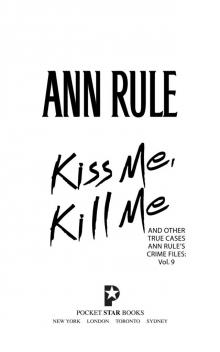 Kiss Me, Kill Me and Other True Cases
Kiss Me, Kill Me and Other True Cases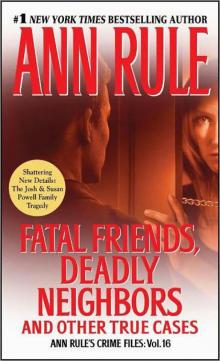 Fatal Friends, Deadly Neighbors and Other True Cases
Fatal Friends, Deadly Neighbors and Other True Cases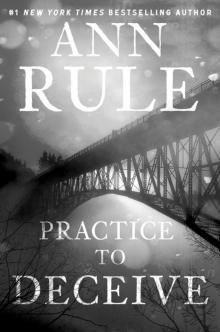 Practice to Deceive
Practice to Deceive Mortal Danger and Other True Cases
Mortal Danger and Other True Cases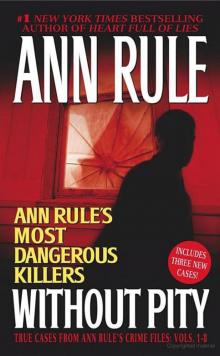 Without Pity: Ann Rule's Most Dangerous Killers
Without Pity: Ann Rule's Most Dangerous Killers Everything She Ever Wanted
Everything She Ever Wanted A Fever in the Heart and Other True Cases
A Fever in the Heart and Other True Cases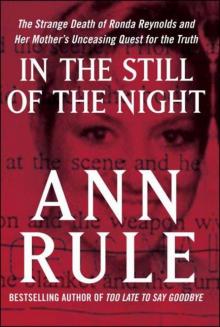 In the Still of the Night
In the Still of the Night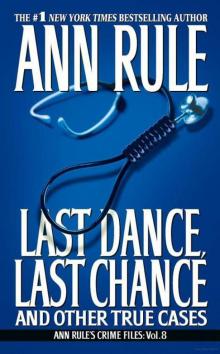 LAST DANCE, LAST CHANCE - and Other True Cases
LAST DANCE, LAST CHANCE - and Other True Cases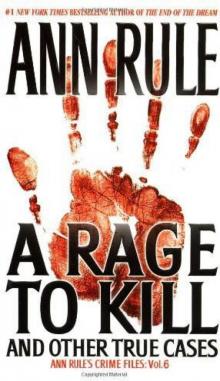 A Rage to Kill
A Rage to Kill The I-5 Killer
The I-5 Killer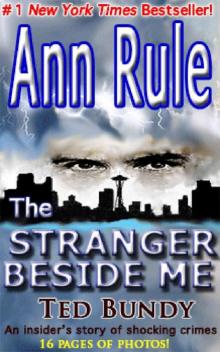 The Stranger Beside Me
The Stranger Beside Me Everything She Ever Wanted: A True Story of Obsessive Love, Murder, and Betrayal
Everything She Ever Wanted: A True Story of Obsessive Love, Murder, and Betrayal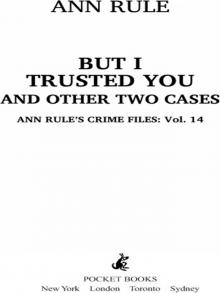 But I Trusted You
But I Trusted You Without Pity
Without Pity Kiss Me, Kill Me
Kiss Me, Kill Me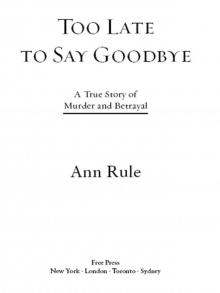 Too Late to Say Goodbye
Too Late to Say Goodbye Lying in Wait
Lying in Wait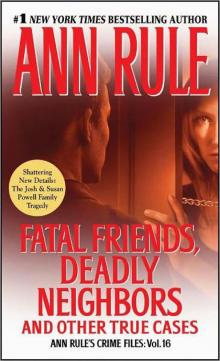 Fatal Friends, Deadly Neighbors
Fatal Friends, Deadly Neighbors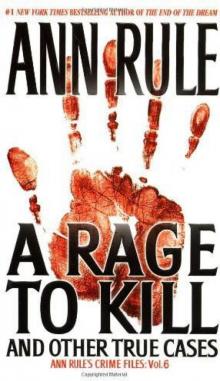 A Rage to Kill: And Other True Cases
A Rage to Kill: And Other True Cases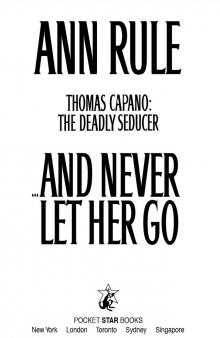 And Never Let Her Go
And Never Let Her Go Lying in Wait Ann Rule's Crime Files Vol.17
Lying in Wait Ann Rule's Crime Files Vol.17 Blood Secrets: Chronicles of a Crime Scene Reconstructionist
Blood Secrets: Chronicles of a Crime Scene Reconstructionist No Regrets
No Regrets Mortal Danger
Mortal Danger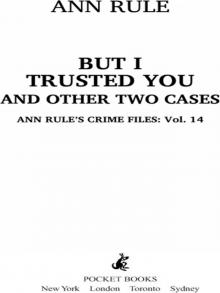 But I Trusted You: Ann Rule's Crime Files #14
But I Trusted You: Ann Rule's Crime Files #14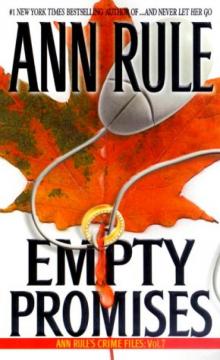 Empty Promises
Empty Promises Dead by Sunset
Dead by Sunset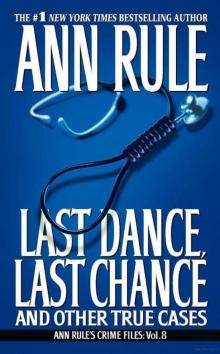 Last Dance, Last Chance
Last Dance, Last Chance Don't Look Behind You
Don't Look Behind You